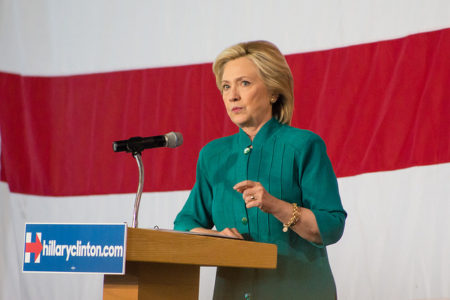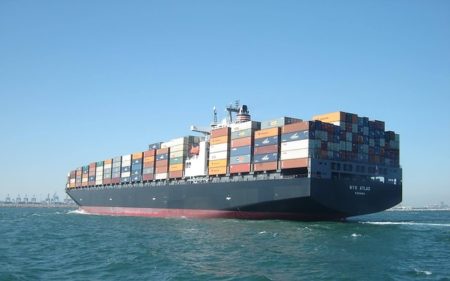By Peter Ward September 9, 2016
The Billionaire’s Tax Loophole Defying Conventional Politics

Democrat presidential candidate Hillary Clinton. ©Gregory Hauenstein
Democrats have long avoided pursuing Wall Street reform too aggressively, lest they lose access to the financial industry’s deep pockets during campaign season. But this election year is different, as an article co-published by The Daily Beast and ProPublica explains this week.
Democratic nominee Hillary Clinton has vowed to close the “carried-interest loophole,” a high profile target for financial reform. The loophole gives favorable tax treatment to partners in private equity firms, some of Wall Street’s wealthiest, who save billions of dollars in taxes each year. Clinton has even said that she would close the loophole through executive action if Congress resisted a legislative fix, a step further than Barack Obama has gone on the issue.
In any normal year this would result in a downturn in campaign contributions to Clinton’s campaign from the private equity sector. But instead, she continues to receive the entirety of the industry’s support-Donald Trump hasn’t received a cent. Granted, Trump himself has vowed to close the loophole, but his other tax reform proposals would save those affected by the carried-interest loophole much more in other areas of finance.
The authors of the ProPublica story argue that the industry continues to support Hillary because it believes the election of Donald Trump would have disastrous effects on markets.
“The day after the election of Donald Trump the market will go down massively as people jump out of stock and bonds and buy gold,” Robert Shrum, a longtime Democratic political consultant now on the faculty of the University of Southern California told ProPublica. “Saving on your taxes on your profits doesn’t do you any good if you don’t have any profits.”
Theranos Downfall in Depth

Elizabeth Holmes, Founder, CEO and Chairman of blood-testing firm Theranos. ©TechCrunch
The downfall of medical technology company Theranos has been an encapsulating tale, not least because of the reporting of John Carreyrou in The Wall Street Journal. This week, Vanity Fair took an in depth look at how the company fell apart.
In October last year Carreyrou wrote his first article on Theranos, which raised questions over the legitimacy of the company’s blood testing technology. Vanity Fair’s more recent piece explains the aftermath of that revelation, and the circumstances that led to the dramatic demise.
Elizabeth Holmes, the CEO and Founder of Theranos, had worked for years to cultivate the ‘story’ of the company, according to the article, and found that the venture capitalist investors and the tech media were more than happy to buy into it without examining the details too closely.
But after Carreyrou’s article revealed that the blood testing technology didn’t work, that story fell apart. Walgreens, one of the company’s largest customers, severed ties with Theranos, and the FDA banned the use of its Edison blood testing device. Lawsuits followed, though Holmes has stayed on.
Reporter Nick Bilton attempted to interview Holmes and others at Theranos for his story, but found that he was only a day or two behind another interested party – the FBI.
Cargo Stranded After Shipping Bankruptcy

Container ship. ©pixabay
What happens to $14 billion worth of cargo stranded around the world when a shipping company goes bankrupt?
Hanjin Shipping, a South Korean company, filed for receivership in its home country last week, after failed attempts to bail it out. Now ports around the world are refusing to accept its cargoes without guarantees that port fees will be paid.
Falling prices, the global economic downturn and fierce competition have all been blamed for Hanjin’s struggles, and the company has amassed debts of about $5.4 billion. It is estimated that 89 of the company’s 141-vessel fleet are in difficulty and some have been seized by creditors.
Hanjin Shipping is the world’s seventh largest ocean shipper, and is part of the Hanjin Group, a conglomerate of companies that also includes Korean Air.
On Tuesday, the parent company Hanjin Group said it will spend $90 million, including $36 million from the personal assets of its chairman Cho Yang-ho, to help resolve the disruption to its cargo.
Samsung Electronics has said it has goods worth around $38 million on Hanjin ships in international water, and it is considering using freighter planes to take goods to customers in the U.S.
Using The Simpsons to Measure Middle Class Progression

Homer Simpson. ©duncan c
What can Homer Simpson tell us about the middle class of America? A lot, according to a data-driven article published by Vox this week.
The article examines how the many jobs the fictional Simpsons dad has held reflect the struggles of middle-class Americans. By listing the salaries of all of the jobs the character has held over 27 seasons of the show, author Zachary Crockett is able to establish Homer Simpson’s median income as $40,510, well inside the range of middle class for the real life town of Springfield, Oregon, where the show is set.
Several graphs and charts later, the article concludes that Homer Simpson has gone nowhere in the past 27 years, and the same could be said of real-life middle-class Americans. The income of the average American family grew with national economic productivity up until the 1970s, but since then wages have been at a standstill, and haven’t kept up with inflation.
“Despite brief forays into the 1 percent as a top-level executive and a CEO, Homer remains a paradigm of middle-class America: Three decades later, he’s right where he started,” the article concludes.
The Week’s Top Headlines
Fox settles with Gretchen Carlson over Roger Ailes sexual harassment claims – Molly Redden, The Guardian
Denmark to Buy Panama Papers Documents to Crack Down on Tax Evaders – Justin Worland, Time
Liberty Media to purchase Formula One – Michelle Castillo, CNBC
iPhone 7 and 7 Plus announced with water resistance, dual cameras, and no headphone jack – Dan Seifert, The Verge
HP Enterprise strikes $8.8 billion deal with Micro Focus for software assets – Paul Sandle, Liana B. Baker, Reuters
Walgreens to Divest Additional Stores for Pending Rite Aid Tie-up – Anne Steele, The Wall Street Journal
ECB keeps interest rates at record low – BBC
Nintendo Soars as Super Mario Mobile Game Comes to the iPhone – Joshua Brustein, Jing Cao, Bloomberg News
Renault considers killing off diesel engines – BBC
Wall Street on Alert to Danger of Donating to Trump-Pence Ticket – Simone Foxman, Saijel Kishan, Dakin Campbell, Bloomberg News
This entry was posted on Friday, September 9th, 2016 at 4:04 pm. It is filed under Week in Review. You can follow any responses to this entry through the RSS 2.0 feed.
Comments are closed.
